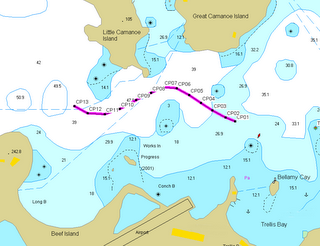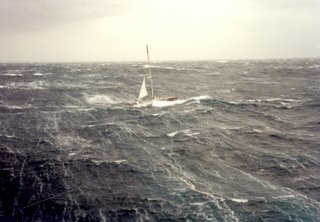Three Poor Choices – the Same Fate

At the Mercy of the Sea, by John Kretschmer, looks at three sailboats and hurricane Lenny. Lenny was a late-season hurricane in November 1999. Lenny did not behave like the “normal” hurricane. Kretschmer looks at three sailboat captains, their boats, their decisions and their fates.
One sailboat (I will call this boat 1) was single-handed by a fairly novice sailor. His boat was an excellent off-shore boat. It was rigged for single-handed sailing. The skipper had a passion for sailing. The skipper did not have significant heavy weather sailing experience.
The second sailboat (I will call this boat 2) was single-handed by an experienced racing sailor. He was bringing the boat from Europe to
The third sailboat (boat 3) was captained by a very experienced sailor. This captain took groups out on day sails. He was a native of the
The captain/owner of boat 3 took off for
Boat 2 sailed into the storm. His boat was sinking when he put out a distress call. Fortunately (?) boat 1 was only a few hours away. Boat 1 heard the distress call, altered course and went to assist. Boat 1 was able to find boat 2. In a daring move, the captain of boat 2 abandoned ship and boat 1 was able to rescue him – in the midst of the horrible hurricane!! They were able to radio authorities and tell them that the rescue had been successful.
Some time later all radio communication with boat 1 ceased. The boat had sunk and both sailors died. No one knows exactly what happened.
Here are the problems:
- The captain of boat 1 had a good heart, was willing to leave his comfort zone to assist others, but he did not have the experience to deal with his boat in a major hurricane. His new “passenger” was exhausted/fatigued from his ordeal and unable to offer needed assistance in handling boat 1.
- The captain of boat 2 had lots of experience but went to sea in a boat that was not designed for that type of sailing. His skill was insufficient to keep the boat afloat and he would have died had boat 1 not been in the vicinity. He was unable to assist the captain of boat 1—boat 1 would eventually be lost.
- The captain of boat 3 had a good boat and lots of experience. His poor choices led to his death.
These three boats represent some of our Presbyterian churches. Some churches are like boat 2—just fine in regular conditions but not designed for extremely rough conditions. They struggle in the face of difficulty, give a valiant effort and some do not survive. Some churches are like boat 1—captained by a well-intentioned person but unprepared to deal with extremely difficult situations. And finally, some are like boat 3—very seaworthy but poor decisions are their downfall.
I believe that the PCUSA is a cross between boats 1 and 3. The PCUSA was a strong denomination through the 1950s. The waters were calm and the sailing was easy. Even a semi-competent person at the helm would have done just fine. The waters became confused and rough as the battles on the authority and interpretation of scripture were going full force. Add to this the cultural shift from a churched culture to an unchurched culture and we had the makings of a full hurricane for the PCUSA. Some denominational leaders were (and are) not equipped to deal with these difficult situations. Others, might have been (or are) skilled enough to deal with the unsettled waters but they have made poor choices – threatening to sink the good ship PCUSA.
Every year sailboats face hurricane conditions. Survival is largely dependent on a skilled captain and crew, a well-built boat, wise decisions and some good luck! Churches and denominations also face hurricane conditions. Survival is largely dependent on skilled and gifted leadership, a biblical theology, Spirit-led wise decisions and the grace of God.
The mainline denominations are in big trouble. Will they survive the hurricane they are facing? The Episcopal Church is being squeezed out of the Anglican Communion due to issues dealing with the ordination of non-celibate clergy and bishops, gay marriage and the authority and interpretation of scripture . The





